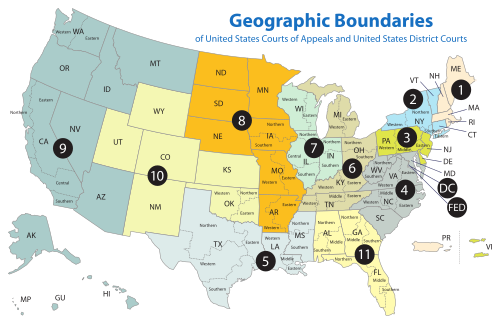Regions of jurisdiction
There are 8 judicial districts, each encompassing five or more of Iowa's 99 counties.

- 1st Judicial District - Allamakee County, Iowa; Black Hawk County, Iowa; Buchanan County, Iowa; Chickasaw County, Iowa; Clayton County, Iowa; Delaware County, Iowa; Dubuque County, Iowa; Fayette County, Iowa; Grundy County, Iowa; Howard County, Iowa; Winneshiek County, Iowa
Chief Judge: Kellyann M. Lekar
- 2nd Judicial District - Boone County, Iowa; Bremer County, Iowa; Butler County, Iowa; Calhoun County, Iowa; Carroll County, Iowa; Cerro Gordo County, Iowa; Floyd County, Iowa; Franklin County, Iowa; Greene County, Iowa; Hamilton County, Iowa; Hancock County, Iowa; Hardin County, Iowa; Humboldt County, Iowa; Marshall County, Iowa; Mitchell County, Iowa; Pocahontas County, Iowa; Sac County, Iowa; Story County, Iowa; Webster County, Iowa; Winnebago County, Iowa; Worth County, Iowa; Wright County, Iowa
Chief Judge: Kurt L. Wilke
- 3rd Judicial District - Buena Vista County, Iowa; Cherokee County, Iowa; Clay County, Iowa; Crawford County, Iowa; Dickinson County, Iowa; Emmet County, Iowa; Ida County, Iowa; Lyon County, Iowa; Kossuth County, Iowa; Monona County, Iowa; O'Brien County, Iowa; Osceola County, Iowa; Palo Alto County, Iowa; Plymouth County, Iowa; Sioux County, Iowa; Woodbury County, Iowa
Chief Judge: Duane E. Hoffmeyer
- 4th Judicial District - Audubon County, Iowa; Cass County, Iowa; Fremont County, Iowa; Harrison County, Iowa; Mills County, Iowa; Montgomery County, Iowa; Page County, Iowa; Pottawattamie County, Iowa; Shelby County, Iowa
Chief Judge: Jeffrey L. Larson
- 5th Judicial District - Adair County, Iowa; Adams County, Iowa; Clarke County, Iowa; Dallas County, Iowa; Decatur County, Iowa; Guthrie County, Iowa; Jasper County, Iowa; Lucas County, Iowa; Madison County, Iowa; Marion County, Iowa; Polk County, Iowa; Ringgold County, Iowa; Taylor County, Iowa; Union County, Iowa; Warren County, Iowa; Wayne County, Iowa
Chief Judge: Arthur E. Gamble
- 6th Judicial District - Benton County, Iowa; Iowa County, Iowa; Johnson County, Iowa; Jones County, Iowa; Linn County, Iowa; Tama County, Iowa
Chief Judge: Marlita Greve
- 7th Judicial District - Cedar County, Iowa; Clinton County, Iowa; Jackson County, Iowa; Muscatine County, Iowa; Scott County, Iowa
Chief Judge: Henry W. Latham
- 8th Judicial District - Appanoose County, Iowa; Davis County, Iowa; Des Moines County, Iowa; Henry County, Iowa; Jefferson County, Iowa; Keokuk County, Iowa; Lee County, Iowa; Louisa County, Iowa; Mahaska County, Iowa; Monroe County, Iowa; Poweshiek County, Iowa; Van Buren County, Iowa; Wapello County, Iowa; Washington County, Iowa
Chief Judge: Myron Gookin [2]
